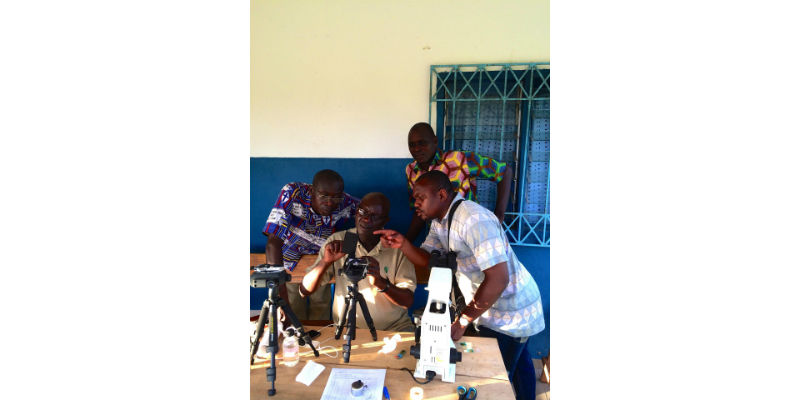Handheld, mobile phone-based microscopes can be used in developing countries after minimal training of community laboratory technicians to diagnose intestinal parasites quickly and accurately, according to a study.
A first of its kind, community-based study carried out in the Republic of Côte d’Ivoire, West Africa found that two different handheld microscopes could both effectively rule in individuals infected by parasites — important in allocating resources for public health screening — but varied in their sensitivity to detect all cases of an illness, in comparison to a conventional laboratory microscope.
The study entitled, “Accuracy of Mobile Phone and Handheld Light Microscopy for the Diagnosis of Schistosomiasis and Intestinal Protozoa Infections in Côte d’Ivoire,” is published online in the open access journal PLOS Neglected Tropical Diseases.
“We wanted to know if we could put these portable field microscopes into the hands of individuals who would use them in day-to-day settings, and whether they would be effective,” Dr. Isaac Bogoch, senior author and physician in internal medicine and infectious diseases at Toronto General Hospital, said. “We wanted to see how they would work in real-world situations where there are few labs,”
Toronto General Hospital is a partner in University Health Network, along with Toronto Western, the Princess Margaret Cancer Centre, Toronto Rehabilitation Institute and the Michener Institute for Applied Health Sciences.

A local laboratory technician in the Ivory Coast is being trained on a portable, handheld microscope to detect intestinal parasites in a remote, rural community. These parasites affect almost two billion people world-wide, predominantly in areas with poor sanitation and unclean water. (Credit: University Health Network)
Intestinal worms affect almost two billion people world-wide, predominantly in areas with poor sanitation and unsafe water. In children, these parasites may lead to malnutrition, stunted growth and development and can lead to chronic disability, with serious health and economic consequences.
Microscopes are vital in the diagnosis and surveillance of many of these parasitic infections, and are a staple in every clinical and public health lab worldwide – except in developing countries where these parasitic infections are common.
Bogoch and his team tested two portable handheld microscopes: A commercial Newton Nm1 microscope and a mobile phone-based CellScope — essentially a smartphone with a special custom-fitted lens attached over the camera and light source, developed by University of California engineers — to detect intestinal parasites.
Local laboratory technicians were trained to operate the two handheld microscopes. In total, the technicians examined stool and urine samples from 226 individuals for the detection of parasites. The accuracy of all slides was evaluated by all microscopes: The two handheld devices, as well as a conventional, “gold” standard microscope.
The two handheld microscopes were very good at ruling in infections, and the Newton portable microscope was able to detect even very low-burden infections. The CellScope missed some low-burden infections, however newer iterations of this device are currently being tested to increase its sensitivity.
“It was heart-warming to see how well and easily these portable, handheld field microscopes were adopted and used in a rural setting,” Bogoch said. “This will help us map out the areas of greatest need.”
He added that novel diagnostic approaches for common parasitic infections could have a profound impact on care of patients, as well as on public health approaches to screening in resource-poor areas.
Accurate, portable, battery-powered microscopes that can deliver quality diagnostics to the poorest of the poor in under serviced areas can significantly ease the severe burden of infectious diseases, he said.




